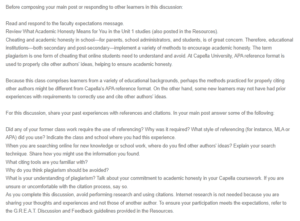Discussion – What Is Academic Honesty?
In many cases, when the notion of academic honesty comes to mind, students may not understand or choose to ignore the essence of practicing academic honesty. It is imperative to understand that academic honesty pertains to the performance of all works related to academics and not engage in plagiarism. Also, one is expected not to engage in tampering, stealing, cheating, lying, tampering or illegitimate assistance from other people. Academic honesty is the basis of learning, research, and teaching at the university, often involving the encouragement of multiplex strategies networks across the entire university fraternity.
There have been many situations in the university where I have been given assignments that needed referencing. In the assignment, I was expected to research a certain project. The research would not have been credible if I did not cite the sources and references for that project. Referencing the project was needed because it was supposed to bolster my argument with credible sources to make my argument more credible. I used APA as it is one of the commonest used in the university. This experience was in the class (indicate your class) in (insert your school). Whenever I search online for new knowledge and concepts, I always find relevant ideas on Google Scholar, Which is essentially an easy way to extensively search for scholarly work, whereby one can search numerous disciplines that are always credible. The searching technique is first to click the years I want the sources to belong to, then type in the topic’s title under my study. The information that I find is used to share with colleagues within the field that we are studying. Some of the citing tools that I am most familiar with include; APA, Chicago, MLA, and Harvard. I strongly believe plagiarism should be avoided because it is unethical, unreliable, and dishonest. Plagiarism pertains to taking someone else’s work and making it look entirely like your own. Academic honesty should be practiced and enforced to bring up a well-equipped generation with the skills necessary to handle diverse fields in society. Plagiarism brings up unskilled professionals, which could be dangerous.
ORDER A PLAGIARISM-FREE PAPER HERE
We’ll write everything from scratch
Question

Discussion – What Is Academic Honesty.
Before composing your main post or responding to other learners in this discussion:
Read and respond to the faculty expectations message.
Review What Academic Honesty Means for You in the Unit 1 studies (also posted in the Resources).
Cheating and academic honesty in school—for parents, school administrators, and students, is of great concern. Therefore, educational institutions—both secondary and post-secondary—implement a variety of methods to encourage academic honesty. The term plagiarism is one form of cheating that online students need to understand and avoid. At Capella University, APA reference format is used to properly cite other authors’ ideas, helping to ensure academic honesty.
Because this class comprises learners from a variety of educational backgrounds, perhaps the methods practiced for properly citing other authors might be different from Capella’s APA reference format. On the other hand, some new learners may not have had prior experiences with requirements to correctly use and cite other authors’ ideas.
For this discussion, share your past experiences with references and citations. In your main post answer some of the following:
Did any of your former class work require the use of referencing? Why was it required? What style of referencing (for instance, MLA or APA) did you use? Indicate the class and school where you had this experience.
When you are searching online for new knowledge or school work, where do you find other authors’ ideas? Explain your search technique. Share how you might use the information you found.
What citing tools are you familiar with?
Why do you think plagiarism should be avoided?
What is your understanding of plagiarism? Talk about your commitment to academic honesty in your Capella coursework. If you are unsure or uncomfortable with the citation process, say so.
As you complete this discussion, avoid performing research and using citations. Internet research is not needed because you are sharing your thoughts and experiences and not those of another author. To ensure your participation meets the expectations, refer to the G.R.E.A.T. Discussion and Feedback guidelines provided in the Resources.

